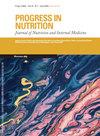Assessment of eating attitudes and body satisfaction among high school adolescents in Turkey
4区 医学
Q4 Agricultural and Biological Sciences
引用次数: 1
Abstract
Background/aims: This research aimed to investigate the relationship between eating attitudes and body satisfaction among adolescents attending high school in Ankara, the capital city of Turkey. Methods: The participants were 718 males and 761 females, in total 1479 adolescents aged between 13 and 18 years. The Eating Attitude Test-26 (EAT-26) and Body Cathexis Scale (BCS) were used to assess eating attitudes and body satisfaction respectively. Data from the study were evaluated statistically by chi-square test. Results: Our results showed that 2.93 % of males and 40.07 of females faced a high risk of having an eating disorder. Our findings confirm that females are more at risk of eating disorders. The BCS of males (90.8 ± 20.8) was found significantly higher than females (81.3 ± 16.8) ( p<0.001), which indicates that females are less content than about their appearance. We also found that 6.3 % of males and 18.2 % of females thought that they were overweight, and 22.9% of females and 4.3 % of males perceived themselves as obese. While 58.6 % of males perceived their body image as correct, 65.8 % of females did not (p<0.05). Conclusion: Together these results confirm that female adolescents tend to be less satisfied with their weight and more likely to display disordered eating attitudes. Keywords: Adolescents, Eating Attitude Test-26, Body Cathexis Scale, Body Satisfaction土耳其高中青少年饮食态度与身体满意度之评估
背景/目的:本研究旨在调查土耳其首都安卡拉高中生的饮食态度与身体满意度之间的关系。方法:参与者为718名男性和761名女性,共1479名年龄在13至18岁之间的青少年。饮食态度测试-26(EAT-26)和身体导尿管量表(BCS)分别用于评估饮食态度和身体满意度。通过卡方检验对研究数据进行统计学评价。结果:我们的研究结果显示,2.93%的男性和40.07%的女性面临饮食失调的高风险。我们的研究结果证实,女性患饮食失调的风险更大。男性的BCS(90.8±20.8)显著高于女性(81.3±16.8)(p<0.001),这表明女性对自己的外表不太满意。我们还发现,6.3%的男性和18.2%的女性认为自己超重,22.9%的女性和4.3%的男性认为自己肥胖。58.6%的男性认为自己的身体形象是正确的,而65.8%的女性则不然(p<0.05)。结论:这些结果共同证实,女性青少年往往对自己的体重不太满意,更有可能表现出紊乱的饮食态度。关键词:青少年,饮食态度测试-26,身体导管量表,身体满意度
本文章由计算机程序翻译,如有差异,请以英文原文为准。
求助全文
约1分钟内获得全文
求助全文
来源期刊

Progress in Nutrition
医学-营养学
CiteScore
1.40
自引率
0.00%
发文量
0
审稿时长
>12 weeks
期刊介绍:
Progress in Nutrition was founded in 1999 as an independent magazine, a multidisciplinary approach, dedicated to issues of nutrition and metabolism.
 求助内容:
求助内容: 应助结果提醒方式:
应助结果提醒方式:


